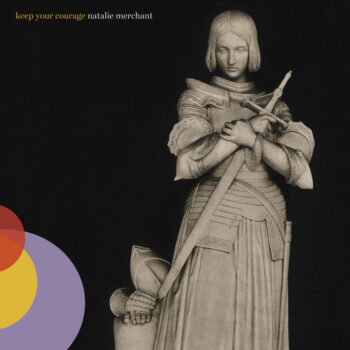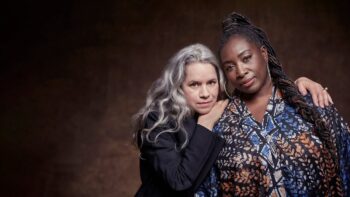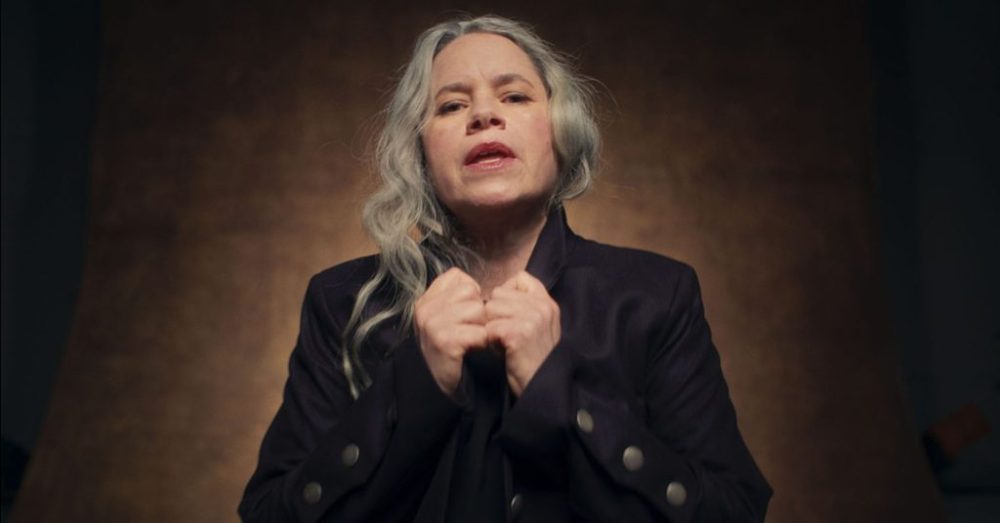Natalie Merchant Keeps Her Courage: Interview
Natalie Merchant has just released Keep Your Courage, her 9th solo album, and first collection of new songs in almost a decade.
We found Natalie on the road in Florida where she is touring with a string quartet.
The 13th Floor’s Marty Duda spoke to Natalie about music, politics and how she survived major health issues (and the pandemic).
Click here to listen to the interview with Natalie Merchant:
Or, read a transcription of the interview here:
Natalie: Well, we’re selling out every show, which has been great. And do I feel a different vibe? Um, people are older. Some of the people. My audience has always been pretty varied, age wise. But the older fans are older. That’s because I started in 1981. So, people who were 10 years older than me are now in their 70s
MD: I’m from Rochester, New York, I remember seeing you in a little place called Scorgies.
Natalie: Yeah, remember Scorgies! (laughs)
MD: It’s been a long strange trip indeed. So with this album sounding the way it does what kind of band you touring with?
Natalie: I’ve a string quartet, upright bass, piano, and accordion. My piano player does accordion as well. Electric and acoustic guitars. backing vocalist, it’s a big group, 10 people out here.
 MD: So the album was called Keep Your Courage, it came out until just a little while ago. And it’s your first studio album and a while. Apart from the touring part, what is releasing a record like in this environment these days? How has it changed in your perspective, since last time you did this?
MD: So the album was called Keep Your Courage, it came out until just a little while ago. And it’s your first studio album and a while. Apart from the touring part, what is releasing a record like in this environment these days? How has it changed in your perspective, since last time you did this?
Natalie: Well, the last time I did this was in 2015, I think, an album of all original material. But I put out a 10 disc boxset back in 2018, 2017 along with an album of…it was half original new stuff and half re-visitations. So I’ve been putting things out. But I haven’t toured much. I think that’s the big difference. And less than less people buy albums every time I go out. I mean, we’ve really transitioned to a streaming audience, for the most part. But we did a vinyl version. It ended up being a double album. It’s got bonus material. So that was interesting, designing an LP, which I haven’t done in decades.
MD: So when you’re making this record, are you thinking in terms of how people are going to be listening to it, how they possibly will be streaming instead of putting it on their turntable or sticking a CD player in the car?
Natalie: I didn’t think about that. But I think my mixer was very aware of the different technologies that people would be using. Because this album sounds amazing coming out of an iPhone speaker. It’s a little uncanny. It’s amazing coming through a high end, like a Hi Fi system. But also, he managed to make it sound great coming…I mean, if you listen to Tower of Babel, you can’t believe that much sound can come out of one of those tiny speakers.
MD: So speaking of the album as a whole, it feels like a whole. When did it start coming together? When did it coalesce in your mind as what this record was going to be?
Natalie: Well, I started writing it right around the time…I should probably look at a calendar and figure out when I started writing because I can try to wing it and you know, the pandemic years are really blurry. When did the pandemic start?
MD: 2020.
Natalie: So in 2019, around Christmas, my spine collapsed. And I spent the month of January in agony. By February, I was having an emergency cervical spine surgery. I spent the first two months of the lockdown in a neck brace with no follow up treatment. So then I lost my voice couldn’t use my right hand. By the time 2021 came around, I could play the piano again. And I could sing again. I think that’s when I started writing.
MD: So that must have been fairly traumatic going through all that stuff in 2020 thinking that…I mean, you could probably had no idea where this was all going. So what was going through your mind?
Natalie: I was grateful to have had the surgery before. I couldn’t imagine going through, I honestly couldn’t imagine going through that full year when, quote, elective surgery was not happening. I couldn’t have gone through it in that pain. So I felt really blessed that I found a phenomenal surgeon and I was able to…the surgeon actually came into my room the morning after the surgery and said, I know you’re supposed to stay here for three days, but I’m sending you home today, this entire country is about to go into lockdown. He knew, because the hospital where I had the surgery became one of the biggest COVID hospitals in Manhattan. So yeah, I felt lucky. And the writing…I wasn’t really writing an album when I started writing, I was just writing to maintain my sanity more than anything…and celebrate having…I always played the piano and sing at home, whether I’m writing songs or not. And to have that taken away for nearly a year was very sad.
 MD: Now the album opens with two tracks that feature you, and another singer, whose name is…
MD: Now the album opens with two tracks that feature you, and another singer, whose name is…
Natalie: Abena Koomson-Davis
MD: Tell me why you made that decision and how the two of you work together.
Natalie: Well, I met Abena in 2018, there was a midterm election and we were strongly supporting a congressional candidate, a young black politician named Antonio Delgado and we invited…the organization that I was a member of was trying to get out the vote for him. So we invited Abena’s chorus to come up the Resistance Revival Chorus, they came up to upstate New York, and we did this concert, and I was just blown away by her energy. She’s very much…music to her as a tool for drawing people together, of celebrating. And it’s about community for her. And I feel the same way. So we connected on that. And I just told her if I wrote a couple songs, which you consider recording one day, and then all that other stuff happened. The health crisis and the lockdown and the pandemic and so we had to wait a few years to be able to do it.
MD: What kind of discussion did you have about how you wanted her to sing or what you wanted her to sing and how your voices worked together?
Natalie: Basically, I sent her a demo, and she came up with what she wanted to sing based on what was on the demo. And we just did it. It was very spontaneous when it came time to be in the studio.
MD: Right. Now, those two tracks are followed by one that I find particularly interesting, Sister Tilly. You managed to mention Joan Didion, and Led Zeppelin in the same song! And it’s almost like a suite within a suite, musically.
Natalie: It has pretty distinctive parts. And it does have a time signature shift, which I don’t think I’ve ever done that in a song before. It goes from three, four to four, four.
MD: And is Sister Tilly kind of a composite character?
Natalie: Yeah, she’s many of the women that I’ve known over the years, who’s in the previous generation, and we’re losing those women and the fact that Joan Didion died the week that I did the vocal for the song also caused me to want to dedicate the album to her.
MD: Had you had you ever met her?
Natalie: No, I never met Joan Didion.
MD: And there’s one cover on the album by a gentleman named Ian Lynch, an Irish musician. So it’s interesting that you managed to even find another song from someone else to fit with your songs. How did that come about?
Natalie: What was strange, I had no intention of actually putting that on the album. It was kind of an exercise that we were doing in the studio. I love the song. I just wanted to teach it to my guitar player. So we were messing around with it and then everyone just fell in love with the song so we started playing it and we just ran the tape. So then every time another group of musicians came, whether it was string players or brass or woodwinds, we would add another track and another layer and another layer and another layer and in the end It sounded so great. I decided to put on the album.
MD: So what’s been the reaction from fans? Has it been taken the way you want it to be when, when you’re performing these songs or people kind of connecting with them?
Natalie: Yeah, it’s the first album that I’ve done that when I play the material for the first time, people aren’t looking impatient. Like they’re waiting, ‘when are you going to play the songs we know? Give us the stuff we know Natalie!’ People are kind of awed by the new material. And I think the way that we’re presenting it with the string quartet, the dynamic range of the songs is really broad. But many of the songs have long sections of a very hushed dynamics, it’s uh, it’s just you can really hear the storytelling in the vocal, and then most of the songs will build and then return to that quiet place where they can really hear the the narrative that I’m telling them.
MD: Speaking of your vocal, so has your approach to your singing changed when you’re singing behind strings and things instead of the general bass guitar and drums?
Natalie: Well, I’ve been singing with symphonic instruments pretty exclusively since 2008. And I didn’t bring a drummer on tour with me for at least 12 years. So this is sort of where I’m, this is my comfort zone. This is where I’m used to working. The fact that I have a drummer on this tour has been unusual. Most of the touring I’ve done the last six years, it’s just been with my acoustic guitar player, just the two of us we do a duo. And we were really stealthy. We can go anywhere we want, which I love. We toured England in the summer of 2018. And we just played places I wanted to see. Like, I’d like to go to Yorkshire and the Lake District. So let’s just book some gigs. It’s a working holiday basically.
MD: Have you been to New Zealand much or ever?
Natalie: Only been to New Zealand once and I had a really lovely time. I’d like to come back. I don’t know if I could bring this massive, 20 headed monster that I have on tour right now with two trucks and two buses and all that. But…
MD: Might be a good place for stealth tour, though. So are you thinking about what you’re planning on doing next, musically? Now that you got this kind of…and you’re back into it.
Natalie: Now that this record has been out for a week?
MD: Yes, exactly. Right.
Natalie: I have a lot of projects actually going on, I need to clone myself right now. I was appointed to the Library of Congress American Folklife Center, and we’re having our 50th anniversary in 2026. And I’m really interested in a project to find songs within the archive and record them with children… games and songs. So that’s something I’m doing research for. I’m doing a project with the Chicago Symphony and the Chicago Children’s Theatre of a group of songs that I wrote, well, I spent two years volunteering with a low income preschool that was run by Head Start and go three days a week, and I wrote a handful of songs for kids that the Chicago Symphony is interested in orchestrating and recording, which would be really fun. I’ve been going to Italy, pretty frequently working with an Italian band on a project of adaptations of a Italian poet.
MD: You got a lot on your plate.
Natalie: Lots of things going on! Yeah, I’m trying to have a lot of folders right on top of my piano right now, but it’s all really fascinating and fun stuff. And I’ve always wanted to speak Italian and tour Italy. And so this is going to give me…I was thinking about the thing I’d actually like to do for fun. And then if music can help me achieve that goal, then it’s like I love working with children and music is a really wonderful tool to use when you’re working with kids.
MD: And are you much of a political animal? Does the stuff that’s swirling around, especially in the States affect you and how you’re feeling about making music?
Natalie: It infuriates me most of the time. Confuses me. I think my work with Head Start was a response to Trump in a way because it felt so overwhelming that I thought, I don’t know where to begin. So maybe the thing to do is to focus on my community and try to do good…a tangible bit of good, right here and now. And I think that those early influences as primary influences in early childhood are so formative. And to be honest, it was also a response to the Black Lives Matter movement, because 98% of the kids that I worked with were children of color. I really felt like if I want to demonstrate how much I believe Black Lives Matter, I should devote myself to spending time with these children and sharing what I can with them, making them feel as special and as treasured as they deserve to be. Because I don’t think the public school system really does that in America. I mean, that’s not that I don’t think, I know. And the experiences that I was able to give those kids in preschool, a lot of the parents came up to me at the culminating event and said, it’s likely my kid will never be in a play of this quality ever again. Or, you know, bringing instruments into the classroom, violins, upright bass and clarinet. concertina, it was an amazing experience for me to see the way that kids responded to instruments that many of those instruments they’ve never been in the same room with.
MD: Thank you very much and good luck with the tour.
Natalie: I think I have to go to soundcheck.
Natalie Merchant’s Keep Your Courage is out now
Click here for more Natalie Merchant
